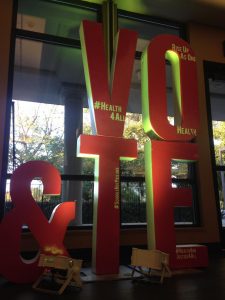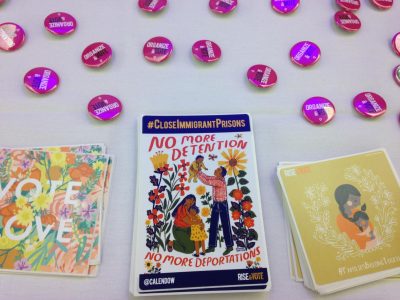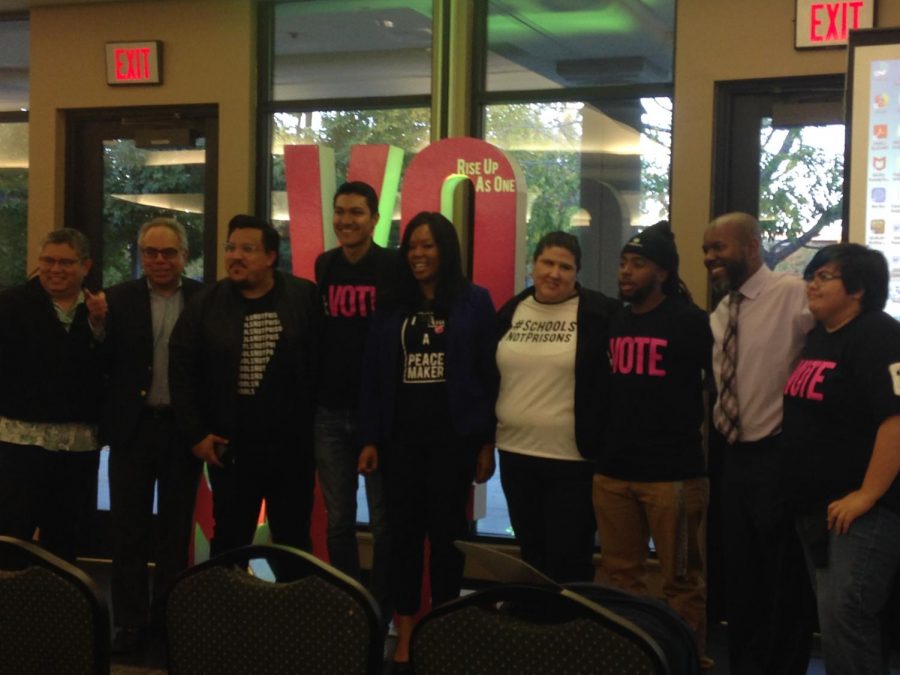California Endowment and student organizations host Black and Brown Voter Summit
The summit aimed to promote civic engagement and increase voter turnout among black and brown students for the midterm election
Camille Escovedo – The State Hornet
Jose L. Plaza from the California Endowment (left), ASI President Noel Mora, speaker Amber Goodwin, Professor Amber Gonzalez, BSU President Cole Carman, Dr. John Johnson, director of the Centers for Diversity and Inclusion, Tyler Cernohlavek, president of the Lavender Collective for LGBT justice. The California Endowment, ASI, Inc., certain professors, the Black Student Union, and the Lavender Collective were some of the collaborators for the Black and Brown Voter Summit Monday, Oct. 29, 2018.
The California Endowment, a health foundation, teamed up with student organizations to promote civic engagement at the Black and Brown Voter Summit at Sacramento State’s Harper Alumni Center Monday night.
The summit aimed to increase voter turnout in racial and ethnic minority students for the midterm elections, according to Coley Carman, president of Sacramento State’s Black Student Union.
The California Endowment promotes community organizing around policies that improve conditions for marginalized groups, primarily people of color and people with low socioeconomic status, according to their website.

The Harper Alumni Center featured posters and structures like this one to promote voting and civic engagement at the Black and Brown Voter Summit Monday, Oct. 29, 2018.
Student organizations that hosted the summit included the Black Student Union, the Latino-based Nu Alpha Kappa fraternity, LGBT activism club The Lavender Collective, Students for Quality Education, the Hmong Health Alliance, the Serna Center and Associated Students, Inc.
The Alumni Center had “Lucha & Vote” banners, a “Pose & Vote” selfie station, and a long table of offering California Endowment shirts, posters, pins, cell phone mounts and stickers calling to vote and hashtags like “#CloseImmigrantPrisons” and “#FamiliesBelongTogether.”
Guest artists DeWayne Ewing Jr., a Sacramento State sociology student known as Consci8us, and Kari Jay performed spoken word poetry for the event. California Endowment’s Jose L. Plaza led the program and introduced the main speaker Amber Goodwin, founder of the Community Justice Reform Coalition from Washington, D.C.
The Community Justice Reform Coalition strives to empower communities of color around gun violence prevention and criminal justice reform, addressing mass incarceration and other issues, Goodwin said.
Voter suppression during American history arose as a topic during her presentation. Goodwin said that despite the Voting Rights Act of 1965, Latino and Asian-Americans could not fully enjoy the right to vote until 1975. That was the year of the expansion of the Voting Rights Act.
Other forms of voter suppression include over a million nonviolent former felons still revoked of their right to vote in Florida, she said.
“So many people who look like us cannot vote,” Goodwin said. Her explanation involved institutional racism and discrimination leading to disproportionate numbers of people of color in the criminal system.
A common theme in the discussion between Goodwin and Plaza was that many voters overlook issues that do not appear to affect them directly. According to Goodwin, This can become a challenge in interracial activism too, when some view immigration as a solely Latino issue or police brutality as a solely black issue when they impact everyone.

The California Endowment offered free stickers, posters, pins, shirts, and more to promote voting and political engagement at the Black and Brown Voter Summit Monday, Oct. 29, 2018. The event aimed to encourage voter turnout among students of color for the midterm election.
Sacramento State student Kaylin Johnson said her most memorable takeaway of the summit was that people have the power to do more than just vote, and to engage in issues that may not affect her directly.
“We all live on this earth together, so it’s not just what helps us or what we can relate to, it’s also people we can’t relate to and who are miles and miles and miles away, but [who] we can still help from far away,” Johnson said.
Goodwin said what sustains her as a community organizer is knowing that her enslaved ancestors survived in order for her to be where she is now.
“It really hits home for me that black and brown people are very resilient, we always have been and always will be,” Goodwin said. ”So I think that’s what keeps me going.”
Your donation will support the student journalists of Sacramento State University. Your contribution will allow us to purchase equipment and cover our annual website hosting costs.






















































































































